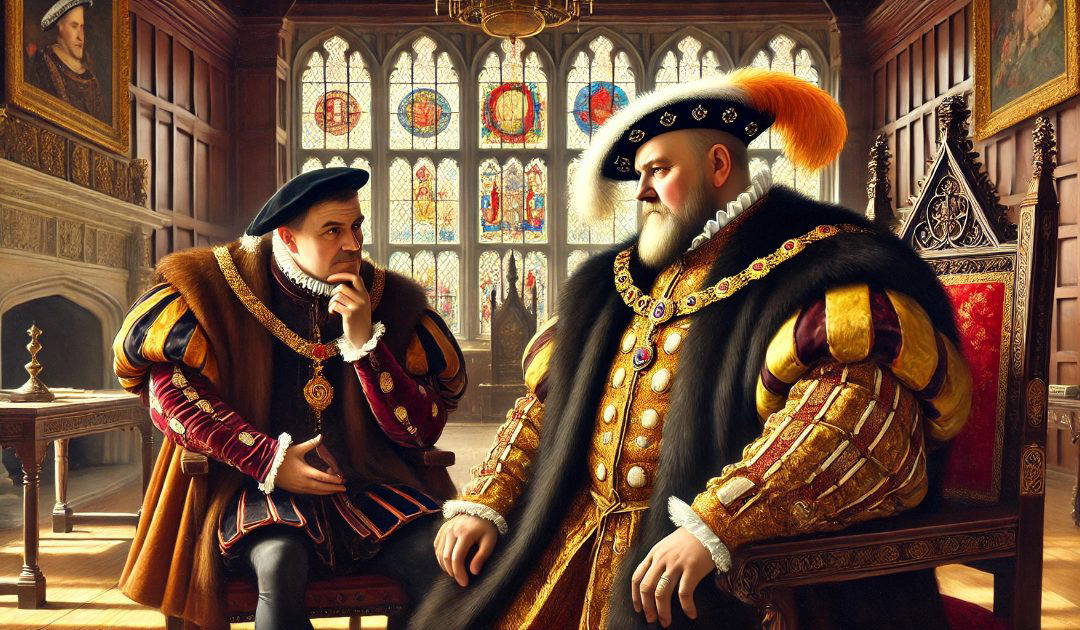On the 16th of May, 1532, Sir Thomas More resigned as Lord Chancellor of England. The story is that of “A Man for All Seasons”, a play which Claire and I have seen twice at the Theatre Royal Bath. On both occasions, several years apart, Martin Shaw played the lead role brilliantly.
Thomas More was born in London to a well-educated family. His father, Sir John More, was a prominent lawyer, which provided Thomas with the foundations for a solid education. He attended St. Anthony’s School, one of the finest schools of the time. At the age of 14, More went to Oxford University, where he developed a profound respect for the classics, studying under notable humanists such as Thomas Linacre and William Grocyn. These academic influences shaped his intellect and fostered his passion for theology and philosophy.
After Oxford, More pursued a legal career at Lincoln’s Inn, following in his father’s footsteps. His aptitude for law and his eloquence soon earned him a reputation as a distinguished lawyer. In 1504, he entered Parliament, quickly establishing himself as a skilled negotiator and a man of principle. One of his early political achievements was opposing King Henry VII’s attempt to levy a tax, demonstrating an early propensity for safeguarding the common good over royal demands.
More’s political ascent continued under the reign of Henry VIII, who appointed him as the Lord Chancellor of England in 1529 following the fall of Cardinal Wolsey. More became the first layperson to hold the position, marking a significant turning point in his career. As Chancellor, More was known for his fairness and diligence, yet he was unyielding in his staunch opposition to Protestant Reformation ideas spreading throughout Europe.
More’s literary contributions are as significant as his political ones. His most famous work, “Utopia,” published in 1516, presents a complex portrayal of a fictional society governed by reason and justice. Through “Utopia,” More critiques the socio-political systems of his time, highlighting the disparity between the rich and the poor, and questioning the morality of English society. The term “utopia” itself has entered the English lexicon, synonymous with an ideal society, reflecting the profound impact of More’s ideas on subsequent generations.
Another notable work, “Dialogue Concerning Heresies,” showcases More’s devout Catholic beliefs. In this text, More articulates his arguments against the Protestant Reformation, defending the authority of the Church and its traditions. These writings reveal the depth of More’s theological knowledge and his unwavering commitment to his faith.
The most defining period of More’s life began with his conflict with King Henry VIII over the latter’s desire to annul his marriage to Catherine of Aragon. More, a devout Catholic, could not condone the King’s actions or his subsequent establishment of the Church of England. His refusal to take the Oath of Supremacy, which declared Henry as the Supreme Head of the Church of England, led to his resignation as Chancellor in 1532.
More’s steadfastness in his faith ultimately led to his imprisonment in the Tower of London in 1534. Despite immense pressure, More remained resolute, refusing to compromise his beliefs. On the 6th of July, 1535, More was executed, leaving behind a legacy as a martyr for his faith and principles. His final words, “I die the king’s faithful servant, but God’s first,” encapsulate his unwavering devotion and moral integrity.
The legacy of Sir Thomas More endures, not only through his literary and political contributions but also through his moral stance. Canonised by the Catholic Church in 1935, More is celebrated as a saint and a symbol of conscience. More’s life has inspired countless works, including Robert Bolt’s play “A Man for All Seasons,” which dramatizes More’s moral dilemmas and his courage to remain true to his beliefs.
In contemporary times, More’s life serves as a poignant reminder of the importance of integrity, the courage to stand up for one’s convictions, and the enduring struggle between personal conscience and political power. His writings continue to be studied and revered, encouraging reflection on societal ideals and the human condition.

